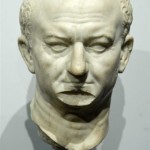No “Vespasian Wuz Here” inscriptions have been found to confirm its ownership, but a magnificent 2000-year-old villa next to the insignificant village where Vespasian was born is most likely his.
“We’ve found a monumental villa with elaborate floors made of marble brought from quarries in Greece and North Africa,” said Dr Helen Patterson, of the British School at Rome, the archaeological institute involved in the excavation.
“There’s also a very extensive bath complex which is just beginning to emerge. It’s the only large villa in the area, and the size and dating fits in perfectly with Vespasian.
“Until we find a stone or marble inscription saying ‘Vespasian lived here’, we can’t be 100 per cent certain, but it seems very likely. It’s in a perfect position, overlooking a river and the old Via Salaria trade route.”
So was it the summer house in which Vespasian died, or was it his wealthy banker father’s house in which the future emperor was born? The Italian newspaper La Stampa says the former, Agence France-Press the latter.
Suetonius mentions he had a summer villa outside Rieti (then Reate) and that that’s where he died.
I’m rooting for the summer villa theory just because the stories about his death are so cool.
He did not cease his jokes even when in apprehension of death and in extreme danger; for when among other portents the Mausoleum [of Augustus] opened on a sudden and a comet appeared in the heavens, he declared that the former applied to Junia Calvina of the family of Augustus, and the latter to the king of the Parthians, who wore his hair long; and as death drew near, he said: “Woe’s me. Methinks I’m turning into a god.”
 That’s an awesome little dig at the Imperial cult that had started with the deification of Julius Caesar in 42 BC, 2 years after Caesar’s assassination. Even on his deathbed Vespasian was a joker.
That’s an awesome little dig at the Imperial cult that had started with the deification of Julius Caesar in 42 BC, 2 years after Caesar’s assassination. Even on his deathbed Vespasian was a joker.
Not to mention a tough old bird:
[…]Taken on a sudden with such an attack of diarrhoea that he all but swooned, he said: “An emperor ought to die standing,” and while he was struggling to get on his feet, he died in the arms of those who tried to help him, on the ninth day before the Kalends of July, at the age of sixty-nine years, seven months and seven days